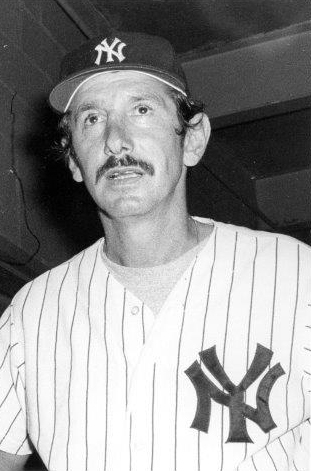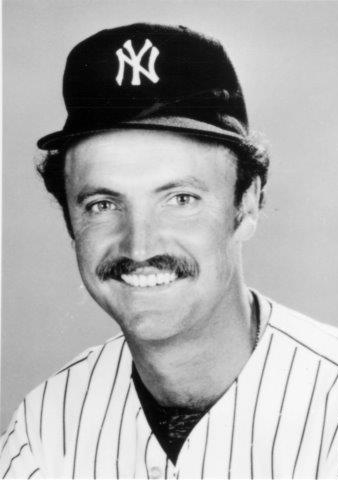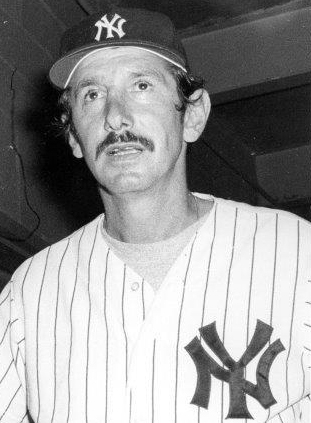Billy Martin and the Baltimore Brawls
This article was written by John J. Burbridge Jr.
This article was published in The National Pastime: A Bird’s-Eye View of Baltimore (2020)
The Yankees headed to Baltimore for a three-game series beginning on September 20, 1985. They had just lost three games in Detroit while being outscored, 24–6, and their losing streak was now seven games. While still in second place in the American League East, they had trailed the Blue Jays for much of the season and were still 5 1/2 games behind them.
The series against the Orioles, would be remembered more for what occurred off the field than what happened on it. Billy Martin, the Yankees manager, was involved in two incidents at the Cross Keys Inn where the Yankees were staying, one on Friday night, one on Saturday. The Saturday night incident involved Eddie Lee Whitson, a Yankees pitcher.
Billy Martin
 Billy Martin was born in Berkeley, California, and played for Oakland in the Pacific Coast League under Casey Stengel. The Yankees acquired him and he excelled in both the 1952 and 1953 World Series. In the seventh game of 1952, he made a game-saving catch of a wind-blown pop fly off the bat of Jackie Robinson. In the following year, he was honored with the Babe Ruth Memorial Award honoring the best player in the World Series.1
Billy Martin was born in Berkeley, California, and played for Oakland in the Pacific Coast League under Casey Stengel. The Yankees acquired him and he excelled in both the 1952 and 1953 World Series. In the seventh game of 1952, he made a game-saving catch of a wind-blown pop fly off the bat of Jackie Robinson. In the following year, he was honored with the Babe Ruth Memorial Award honoring the best player in the World Series.1
While outstanding in those postseasons, Martin will forever be remembered in Yankees lore for incidents like the one at the Copacabana where he and his Yankees teammates got into a skirmish that made headlines, or his fights with Clint Courtney and Jimmy Piersall.2 In 1957 the Yankees decided that Martin was not a good influence on other Yankees (particularly Mickey Mantle) and traded him to the Kansas City Athletics. He finished his career bumping around midwest teams: Detroit, Cleveland, Cincinnati, Milwaukee. In 1960 came what might be his most infamous fight as a player. After a suspected beanball, Martin punched Chicago Cubs pitcher Jim Brewer in the face, causing significant damage. The incident resulted in Brewer suing Martin for one million dollars. After years of litigation, the suit was settled for $10,000.3
Following the conclusion of his playing career, Martin managed the Minnesota Twins, Detroit Tigers, Texas Rangers, and the Yankees. His brawls continued even then. While managing the Twins, Martin got into a fight with his own pitcher, Dave Boswell. He inflicted serious damage to Boswell’s face.4 In 1977 he and Reggie Jackson almost came to blows in a nationally televised game at Fenway Park. And, of course, there was the knockout of marshmallow salesman Joseph L. Cooper in Minnesota.5
While such antics should have discouraged teams from hiring Martin, his reputation for being able to turn teams into winners proved very attractive to owners and general managers. Both Detroit and Minnesota made the playoffs with Martin at the helm. In 1977 he led the Yankees to a World Series victory over the Los Angeles Dodgers. When asked about Martin’s managerial prowess, Casey Stengel said, “He’s a good manager. He might be a little selfish about some things he does and he may think he knows more about baseball than anybody else and it wouldn’t surprise me if he was right.”6
Prior to the 1985 season, Martin had managed the Yankees on three occasions. He was fired by George Steinbrenner each time. In all of Martin’s managerial stints, he was somewhat successful, but his abrasive personality often resulted in issues. The Yankees hired Martin for a fourth time when Steinbrenner fired Yogi Berra shortly after the beginning of the 1985 season.
While the Yankees did improve under Martin’s leadership in 1985, they were obviously struggling as they headed to Baltimore. The seven-game losing streak was clearly taking a toll on Martin, a man who detested losing.
Eddie Lee Whitson
 Whitson was signed by the Yankees during the 1984-85 off-season. A native of Tennessee, he was originally signed by the Pittsburgh Pirates in 1974. His major league career began with the Pirates in 1977. During the 1979 season he was traded to the San Francisco Giants. While with the Giants, he was involved in a fight before a game with Giants reserve infielder Roger Metzger. Supposedly Metzger commented that Whitson needed to refine his bunting skills. Whitson, 6’3” and weighing 205 pounds, knocked out Metzger, attesting to his pugilistic ability.7 Whitson was also skilled in the martial arts.
Whitson was signed by the Yankees during the 1984-85 off-season. A native of Tennessee, he was originally signed by the Pittsburgh Pirates in 1974. His major league career began with the Pirates in 1977. During the 1979 season he was traded to the San Francisco Giants. While with the Giants, he was involved in a fight before a game with Giants reserve infielder Roger Metzger. Supposedly Metzger commented that Whitson needed to refine his bunting skills. Whitson, 6’3” and weighing 205 pounds, knocked out Metzger, attesting to his pugilistic ability.7 Whitson was also skilled in the martial arts.
The Giants traded Whitson to the Cleveland Indians for Duane Kuiper after the 1981 season. He pitched for the Indians in 1982 but was traded to the San Diego Padres after the season. Whitson had a very good 1984 season with the pennant-winning Padres. After the Padres lost the first two games against the Chicago Cubs in the NLCS, he won game three in San Diego, pitching eight effective innings. San Diego won games four and five to capture the NL pennant, but lost to the Tigers in the World Series. Whitson was pummeled in his only start.
Whitson became a free agent after the 1984 season and signed a five-year, $4.5 million contract with the Yankees. After a few poor performances during the 1985 season, Yankees fans not only booed him relentlessly to the point of psychological duress, Whitson was finding his home driveway vandalized with nails and tacks and once was even pursued by a carload of drunken fans upon leaving the Stadium. (By 1986, then-manager Lou Piniella would decide only to play him in away games, and even Whitson’s family couldn’t come to Yankee Stadium without suffering the wrath of fans.8) His relationship with Martin was simultaneously deteriorating as Whitson was not happy with the control Martin exercised over his pitch selection. Whitson bounced back somewhat during the late summer months but gave up four runs in just two innings in a start against Toronto on Sunday, September 15.
The Cross Keys Inn
The Village of Cross Keys is in northern Baltimore City, fairly close to Pimlico Race Course. The Village was designed and developed by James Rouse, an entrepreneurial real estate developer who was also the architect of Baltimore’s Inner Harbor complex, Faneuil Hall in Boston, and many other projects. He was also responsible for the development of the model city Columbia, Maryland.
Part of the Village of Cross Keys was a hotel: the Cross Keys Inn. Yankees traveling secretary, Bill “Killer” Kane, decided to house the Yankees at this hotel during their trips to Baltimore in 1985. Cross Keys was a more bucolic setting than downtown Baltimore. Kane may have thought he was keeping the Yankee players away from the downtown nightlife. In addition, the Inn was a bit closer than downtown to Memorial Stadium on 33rd Street.
September 20, 1985
Whitson was under the assumption he was to be the starting pitcher for the opening game of the series on September 20, having started the previous Sunday. However, Martin gave the start to Rich Bordi instead. Whitson was very unhappy with the move and expressed his displeasure in the clubhouse before the game.9 While Bordi was somewhat effective, the Orioles sent the Yankees to their eighth consecutive loss, 4–2. After the game Martin and several Yankees coaches and players gravitated to the bar at the hotel where a wedding party was celebrating. Once he had a few drinks, Martin was in a jovial mood and bought the bride, groom, and others in the wedding party a bottle of champagne. He even danced with the bride.
Eventually, the couple left the bar for their hotel room, but minutes later the groom, still in his tuxedo and weaving unsteadily, reappeared at Martin’s side. “Hey, Billy, we’ve got to talk,” he exclaimed. “You told my wife she has a potbelly.” Martin replied without any emotion, “I did not say she had a potbelly.” He pointed at another woman at the bar with her husband and added, “I said this woman had a fat ass.”10
While Martin had angered two individuals, the brief scuffle ended with no punches being thrown. When word of the incident reached Yankees’ owner, George Steinbrenner, he wondered about the curfew he had supposedly put in place.
September 21, 1985
The Yankees’ losing streak finally ended with an 5-2 victory on Saturday afternoon. After the game, Bill Pennington, then the Yankees beat writer for the Bergen Record, found Eddie Lee nursing a long-necked Bud in the Cross Keys bar. A brief discussion of the previous night’s skirmish occurred. Whitson then left the bar for dinner.
As the dinner hour was approaching, several Yankees including Martin headed downtown to a crab place Martin enjoyed. Others went to Little Italy for dinner. By midnight almost all were back at the Cross Keys bar. Martin sat at the bar talking with Dale Berra, Yogi’s son, and Dale’s wife, Leigh. Whitson sat in a booth behind Martin; both had been drinking most of the night.
Next to Whitson, only a few feet away, was Albert Millus, an attorney from Binghamton, NY, who had tickets to the games in Baltimore. In an interview years later, Millus said, “Whitson was agitated and talking loudly about Billy Martin. A woman, I think Dale Berra’s wife, came over to Whitson and was trying to calm him. But Whitson kept saying things like, ‘That man won’t pitch me’ or ‘That S.O.B. won’t play me.’”11
Milius also said that Whitson turned and grabbed him by the throat, accusing Milius of eavesdropping. Finally, Martin came over to Whitson to intervene, saying something like “Eddie, you’re drunk, you don’t need this.”12 Whitson then turned his rage at Martin. A wrestling match ensued during which Whitson may have kicked Martin several times, once in the forearm.
As the two were separated, they were pulled from the bar into the hotel lobby. Whitson broke away and kicked Martin in the groin. A stunned Martin said to Whitson, “Now I’m going to have to kill you.”13 Whitson was finally corralled and taken outside. An incensed Billy wanted to continue the fight and tried to exit through a sliding glass door to get at Whitson. Yankees coaches tried to block his path. Martin got past them and the fight recommenced outdoors. Eventually, the two were separated and escorted back to their rooms.
September 22, 1985
Once Martin reached his room in the early hours of Sunday morning, it became obvious he had injured his arm. Realizing he had just lost a fight, he challenged Whitson to meet him in the parking lot to continue the fracas, but coaches and staff interceded so nothing further ensued. Bill Kane also called Steinbrenner to give him the details of the fight. Once again, a confused Steinbrenner wondered what happened to the curfew.
Finally, Martin was taken to the emergency ward at Union Memorial Hospital where the injury was diagnosed as a broken arm. His arm was put in a cast, and he returned to Cross Keys at approximately 4:00 am.
It was also decided that Whitson should not be in attendance during the Sunday afternoon game. Kane arranged for him to be driven back to his home in Closter, New Jersey, on Sunday morning.
Martin managed the Yankees that Sunday to a 5–4 win. When spotted with his arm in a cast, he joked that he hurt it bowling.14 After making this comment to the local reporter, Martin did discuss the fight with the eight beat writers from the New York area. He stressed that he was trying to be a peacemaker and accused his adversary of using his feet to win the fight. When asked if Whitson could still pitch for him, Martin responded:
I’ve always said I would play Adolf Hitler and Benito Mussolini if they could help me win. I don’t have to like them. If he can help us win the pennant, I’ll pitch him. And I’ll yank him from the mound, too, if he has to be yanked. But I’ll watch his feet.15
Steinbrenner made it known he would be investigating the incidents and said the following about any punishment, “Ed Whitson will not be suspended at this time, nor will Billy. I don’t know how I could take action against one without taking action against the other.”16 Steinbrenner was also critical about players being in the bar after the 1:00 am curfew.17
Aftermath
After the Sunday game in Baltimore, the Yankees lost a few games but then rallied while Toronto was faltering. The final three game series of the year was in Toronto. The Yankees were now three games back and if they could sweep, there would be a playoff. Whitson started the Friday night game but was not still on the mound when the Yankees prevailed in dramatic fashion. However, they lost on Saturday, eliminating them from contention.
On October 27, Steinbrenner replaced Martin with Lou Piniella, making Martin a special assistant to Steinbrenner. After the Yankees had two somewhat unsuccessful seasons, George once again asked Martin to manage the Yankees for the 1988 season with Piniella becoming general manager. While Steinbrenner had issues with Martin’s off-field activities, his desire to win outweighed other concerns. Still, after several additional incidents, Martin was once again replaced by Piniella.
After being ousted as manager for the final time, Martin sought refuge with his new wife Jill in his recently bought lake house in the Binghamton area of New York. On Christmas Day, 1989, Martin and his close friend Bill Reedy went to a local bar. After a day of drinking, Martin was killed in an automobile accident on the slick, icy road leading to his home.18
Whitson’s days with the Yankees were also numbered. Although he began the 1986 season with the team, he was traded mid-season back to the San Diego Padres. He had a few good seasons there and retired in 1991. He has resisted inquiries to give his version of his fight with Billy.
The Cross Keys Inn, now part of the Radisson chain of hotels, still stands as part of the Village at Cross Keys. As far as this author was able to determine, no one who currently works there remembers the tumultuous weekend in September 1985.
Dr. JOHN J. BURBRIDGE JR. is currently Professor Emeritus at Elon University where he was both a dean and professor. He is also an adjunct at York College of Pennsylvania. While at Elon he introduced and taught Baseball and Statistics. He has authored several SABR publications and presented at SABR Conventions, NINE, and the Seymour meetings. He is a lifelong New York Giants baseball fan. The greatest Giants-Dodgers game he attended was a 1-0 Giants’ victory in Jersey City in 1956. Yes, the Dodgers did play in Jersey City in 1956 and 1957. John can be reached at burbridg@elon.edu.
Related link
Click here to watch a replay of John Burbridge’s SABR Virtual presentation on “Billy Martin’s Baltimore Brawls.”
Sources
Photos: National Baseball Hall of Fame Library
Notes
1 Jimmy Keenan and Frank Russo. “Billy Martin,” SABR BioProject, https://sabr.org/bioproj/person/59c5010b
2 Michael Goodwin, “The Two Sides of Billy Martin: A Study In Contrast,” New York Times, May 6, 1985, C6.
3 Jimmy Keenan and Frank Russo.
4 Bill Pennington, Billy Martin: Baseball’s Flawed Genius, (Boston New York: Houghton Mifflin Harcourt, 2015), 168-169.
5 Murray Chass, “Martin Denies That He Hit Man in Hotel,” The New York Times, Oct. 26, 1979, A23.
6 Jimmy Keenan and Frank Russo.
7 Mike Huber, “Ed Whitson”, SABR BioProject, https://sabr.org/bioproj/person/c2fc4b97
8 Murray Chass, “No Relief In Sight for Whitson as Ordeal Goes On,” New York Times, April 20, 1986, A.
9 Bill Pennington, 417.
10 Bill Pennington, 419-420.
11 Bill Pennington, 421.
12 Bill Pennington, 422.
13 Bill Pennington, 423.
14 Murray Chass, “Martin Jokes After Brawl,” New York Times, September 23, 1985, C1.
15 Murray Chass, September 23, 1985.
16 Murray Chass, “Yankees Planning No Punishment,” New York Times, September 24, 1985, B7.
17 Murray Chass, September 24, 1985.
18 Murray Chass, “Billy Martin of Yankees Killed in Crash on Icy Road,” New York Times, December 26, 1988, A1.


